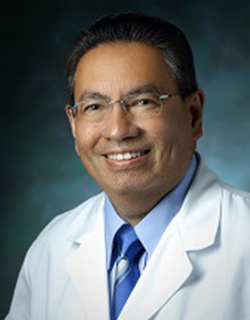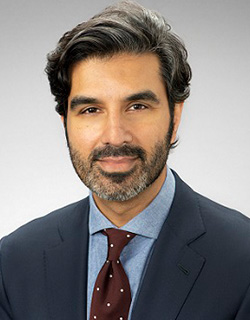Thyroid Conditions: Symptoms, diagnosis, and treatments
January 12, 2022Nearly 50,000 new cases of thyroid cancer are projected to be diagnosed in the U.S. in 2022. The good news is that 85% of those cancers will fall into the category of differentiated thyroid cancers, which are very treatable. “With a skilled and experienced surgeon and treatment team, most patients with this type of thyroid cancer can expect to be cured,” said Farzad Masroor, MD, head and neck surgeon at GBMC’s Milton J. Dance, Jr. Head and Neck Center.
The thyroid is a butterfly-shaped gland located in front of the windpipe or trachea. It’s an endocrine gland that makes hormones that affect a wide range of processes in your body, from how quickly you burn calories to your heart rate, breathing, body temperature, cholesterol levels, and women’s menstrual cycles.
There are several types of thyroid disorders, including hypo- and hyperthyroidism, which cause the gland to be under or overactive, and thyroid cancer. Hypo- and hyperthyroidism are usually treated with medications and radioactive iodine, though in some cases surgery may be an option. Most cases of thyroid cancer are treated with surgery to remove part or all of the gland and any surrounding lymph nodes where cancer is found followed by treatment with radioactive iodine.
Thyroid cancer falls into three groups—differentiated thyroid cancer, where the cancer arises from cells in the lining of thyroid; medullary thyroid cancer, which is not as common and is slightly more aggressive; and anaplastic thyroid cancer, which is very rare and very aggressive.
“Common symptoms of thyroid cancer include changes in your voice or hoarseness, changes in breathing, where it becomes harder to breathe or your breathing becomes noisy, and difficulty swallowing,” explained Ray Blanco, MD, medical director of GBMC’s Milton J. Dance, Jr. Head and Neck Center. “Some people notice a lump in their neck, indicating an enlarged thyroid, or they have no symptoms and changes in the thyroid are discovered by their primary care physician during an annual physical or during a work-up for another health condition.”
People who are at a greater risk for thyroid disease and thyroid cancer include those with autoimmune diseases like rheumatoid arthritis and type 1 diabetes, people who had past radiation treatment of the neck, and people who are overweight. Gender also plays a role—thyroid cancer is three times more likely in women between the ages of 40 and 60. For medullary thyroid cancer, genetics can increase risk. “After surgery for thyroid cancer, many patients are able to go home the same day,” added Dr. Masroor. “Recovery is not particularly painful and pain management requires only Tylenol or ibuprofen.”





